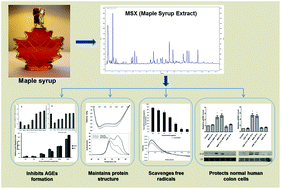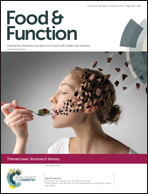Anti-glycation and anti-oxidative effects of a phenolic-enriched maple syrup extract and its protective effects on normal human colon cells†
Abstract
Oxidative stress and free radical generation accelerate the formation of advanced glycation endproducts (AGEs) which are linked to several chronic diseases. Published data suggest that phenolic-rich plant foods, show promise as natural anti-AGEs agents due to their anti-oxidation capacities. A phenolic-enriched maple syrup extract (MSX) has previously been reported to show anti-inflammatory and neuroprotective effects but its anti-AGE effects remain unknown. Therefore, herein, we investigated the anti-glycation and anti-oxidation effects of MSX using biochemical and biophysical methods. MSX (500 μg mL−1) reduced the formation of AGEs by 40% in the bovine serum albumin (BSA)–fructose assay and by 30% in the BSA–methylglyoxal (MGO) assay. MSX also inhibited the formation of crosslinks typically seen in the late stage of glycation. Circular dichroism and differential scanning calorimeter analyses demonstrated that MSX maintained the structure of BSA during glycation. In the anti-oxidant assays, MSX (61.7 μg mL−1) scavenged 50% of free radicals (DPPH assay) and reduced free radical generation by 20% during the glycation process (electron paramagnetic resonance time scan). In addition, the intracellular levels of hydrogen peroxide induced reactive oxygen species were reduced by 27–58% with MSX (50–200 μg mL−1) in normal/non-tumorigenic human colon CCD-18Co cells. Moreover, in AGEs and MGO challenged CCD-18Co cells, higher cellular viabilities and rapid extracellular signal-regulated kinase (ERK) phosphorylation were observed in MSX treated cells, indicating its protective effects against AGEs-induced cytotoxicity. Overall, this study supports the biological effects of MSX, and warrants further investigation of its potential as a dietary agent against diseases mediated by oxidative stress and inflammation.



 Please wait while we load your content...
Please wait while we load your content...